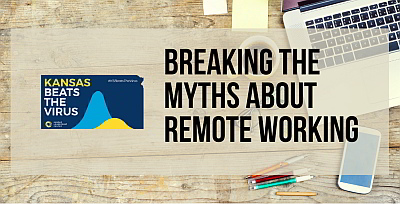Scholarship Recipient Reflects on Training Experience
By Ellen Barber
Leadership has many definitions, but I like the one the Kansas Leadership Center (KLC) uses — “It’s an activity that mobilizes others to make progress on difficult challenges.” Anyone can do that sort of leadership; they don’t have to have a title. I guess that speaks to me too, because what I do, economic development, is all about doing the hard things, and not doing it alone, because that’s just impossible.

Ellen Barber is Executive Director of Marshall County Partnership 4 Growth and was the first recipient of the McKinney Leadership Scholarship.
I was able to attend the KLC’s Leadership Edge Class via Zoom recently on the Doug McKinney Scholarship from the North Central Regional Planning Commission. It was a unique covid-safe experience with nearly 200 people sharing the screen and being “dropped” into small groups for fleshing out the concepts.
Something I learned was that there are two parts to leadership and choosing the skills that go with each type becomes crucial to success. One type is the how-to or technical skill side. I deal with this having to follow rules in speaking to city councils, in writing a grant, or finding research. There isn’t usually a lot of conflict or different interpretations here.
But the other leadership part is adaptive. It requires “new learning with stakeholders engaged in smart experimentation.” Lots of interpretation here! That’s where the leadership gets hard. Cultures at work, home, and community don’t always care to experiment or try new things. There is unwanted conflict that comes from the “unspoken motivations” involved with changes to a system. Yet an open mind and a willingness to learn and grow and try new things to benefit others is a key to any progress. Leaders realize some conflict is necessary if there is to be new growth. Challenging the status quo and asking good questions helps people grow their viewpoints.
In the class, we shared an issue and then challenged each other with questions that made us think deeply about how we were handling that issue. Were we involving all the stakeholders needed to truly solve a problem? What kinds of smart experimentation were we leading our group to try?
Shortly after the class, I found out that the Marysville Pony Express Museum and the Convention and Tourism office were working to join ranks to solve some shared staffing problems. I found this a great example of leadership. They were working on the technical things like the job descriptions each group would share with the one person who would work part-time with both groups. But they were also doing the creative side of how to meld values and what sort of system would attract and keep a great employee.
I am pleased to earlier see our Chamber and Main Street join under one roof, and now two entities of tourism. Topeka has combined 11 offices with similar economic goals under one roof, and Manhattan has one office with many facets for economic development and a single website that covers all of the city, tourism, development ideas, and even the town’s job site. It’s a stretching idea, but much more progress has come with working together to share the challenges, ideas and purpose. NCRPC is also a great example of so many segments of regional development working under one roof with great success.
Any organization can make progress when we take action not only on the how-to side of leadership, but also the creative, adaptive side where we are willing to try new things to solve old problems…and even if they should fail, it will lead to the next better outcome from the lessons learned. To those who aspire to better leadership, keep on taking (technical and adaptive) actions to motivate each other to do the hard things!
This article appeared in the March 2021 NCRPC Newsletter.





 The NCRPC administered the program offered by its housing non-profit, NCK Housing Opportunities, Inc. The non-profit serves Cloud, Ellsworth, Jewell, Lincoln, Mitchell, Ottawa, Republic, and Saline counties. An award from the Dane G. Hansen Foundation of Logan, Kansas, assisted in the creation of the loan and grant pool. An award from the Evergy Hometown Economic Recovery Program provided the grant portion of the program for Ottawa County home buyers.
The NCRPC administered the program offered by its housing non-profit, NCK Housing Opportunities, Inc. The non-profit serves Cloud, Ellsworth, Jewell, Lincoln, Mitchell, Ottawa, Republic, and Saline counties. An award from the Dane G. Hansen Foundation of Logan, Kansas, assisted in the creation of the loan and grant pool. An award from the Evergy Hometown Economic Recovery Program provided the grant portion of the program for Ottawa County home buyers.